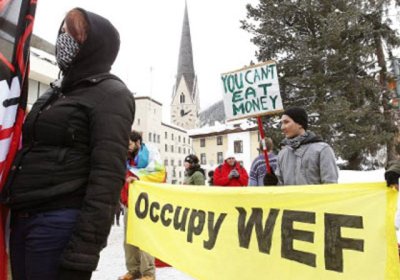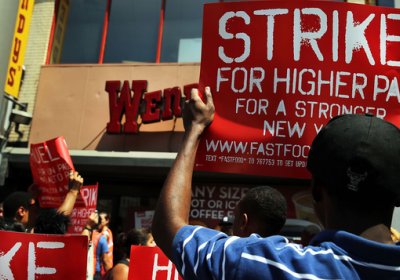When unionised oil workers at the Tesoro Golden Eagle plant in Martinez, California walked off the job on February 1 to demand safer working conditions, they received some unexpected company on the picket line.
Since the start of the strike, which has expanded from nine to 11 refineries nationwide, environmental activists with Communities for a Better Environment have joined members of the United Steelworkers (USW) union for their daily protests outside the plant.
Peter Rugh
Once a year, the world's political and business leaders flock to a small town in the Alps to drink champagne, chow down on fondue and chocolate-covered strawberries, hit the ski slopes, bathe in hot tubs and exchange business cards as they congratulate themselves on the fine job they're doing running things.
Oh, and while in Davos, Switzerland, they also take part in the World Economic Forum (WEF), which took place from January 22-25.
As US President Barack Obama continued his economic speaking tour, walkouts at fast-food restaurants rippled across cities nationwide in early August, calling attention to the nation’s growing wealth gap.
At the franchise stores of McDonald’s, Taco Bell, Burger King and KFC and other grease-slinging corporations, thousands of people protested the low wages dished out by the biggest names in the industry and raised a common demand: US$15 (A$16.30) an hour and the right to unionise.
As more people start to share scientists' long-expressed concerns over climate change, revelations of big bank energy market manipulations highlight Wall Street's entrenched stake in the fossil fuel economy that is heating up the planet.
The Barack Obama administration has proposed new regulations for hydraulic fracturing on 756 million acres of public and tribal lands.
The rules were written by the drilling industry and will be streamlined into effect by a new intergovernmental task force, established by the president, to promote fracking ― a practice that has been linked to water poisoning, air pollution, methane emissions and, most recently, earthquakes.
AS PRESIDENT Obama weighs whether to give the Keystone XL pipeline his approval, climate scientists have warned that the volume of greenhouse gases released by the pipeline could push the planet over a climate tipping point.
Three-and-a-half months ago, the walls upstairs at the Church of the Prophecy in Far Rockaway, a low-income coastal neighborhood of New York City, were covered with maps of where help was most needed.
The church was a hub for the Occupy Sandy relief effort after Hurricane Sandy hit last October, established by Occupy Wall Street activists to help communities rebuild.




